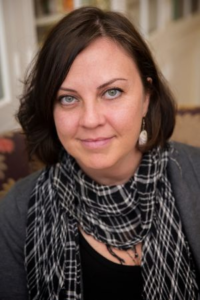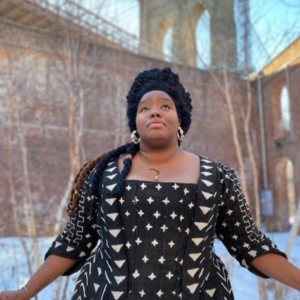On Thursday, Feb. 24, the University of Lynchburg will host Dr. Kelley Fanto Deetz and Cheyney McKnight for a Black History Month lecture, “History as Power: Racial Reconciliation and Restorative Justice through Storytelling.”

The event, which is free and open to the public, begins at 7:30 p.m. in Hall Campus Center’s Memorial Ballroom. Afterward, there will be a panel discussion and Q&A session. The lecture is sponsored by the Clifton and Dorothy Bundy Potter Lecture Fund, Historic Sandusky, the Department of History, and the Office of Equity and Inclusion.
During the event, Deetz and McKnight will discuss how they use storytelling to change public perceptions of the history and legacy of slavery and race in America. In their work, which is often done at historical sites, they use food, cooking, clothing, and documents to help people better understand America’s past culture.
Deetz is the author of “Bound to the Fire: How Virginia’s Enslaved Cooks Helped Invent American Cuisine.” In 2016, the archaeologist and historian spoke about her research at Historic Sandusky. Deetz also is director of collections and visitor engagement at Stratford Hall, the Lee family home in Virginia’s Northern Neck.
McKnight is a historical interpreter and the founder and owner of Not Your Momma’s History. According to its website, NYMH “helps museums, historical sites and societies, private businesses, and other organizations develop specialized programming about slavery and the African experience within 18th and 19th century America” and “trains staff from all backgrounds on how to talk about slavery with diverse audiences.”
McKnight also lectures on various topics — clothing enslaved people wore, what it was like to be a house servant, etc. — and created “Let’s Talk About Slavery,” a traveling program where people can learn about slavery in a casual, public setting.

As he reflected on the upcoming lecture, Dr. Robert L. Canida II, vice president of inclusive excellence at Lynchburg, said he was reminded of a quote by author Marianne Williamson: “A change of heart leads to change in behavior, and a change in behavior leads to changing the world.”
He added, “Racial reconciliation and restorative justice are vitally essential to an organization’s overall success. Here at the University of Lynchburg, we continue to search for understanding and strive to be conscious of our similarities and differences.
“I am so proud to be part of a campus community that sees the necessity to have these types of conversations, even with the possibility of causing some discomfort. It is through our discomfort that we grow.
“And as Marianne’s quote speaks to a change in behavior, I believe this change will lead to a better understanding of each other, thus creating opportunities that will benefit all communities.”
For more information about the lecture, contact Canida at 434.544.8540 or canida_rl@lynchburg.edu.

